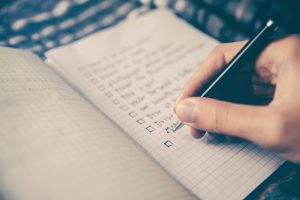When it seems like there are never enough hours in the day, sleep can become the first thing to be cut back in our schedules. And, when finding ourselves in a hectic, stressful or unhealthy cycle, sleep can be one of the first things to suffer. As you saw in Nutrition 101 – Strength Training and Sleep, sleep is important for every aspect of your life, especially if you have an illness, injury, or are just trying to get into better physical condition. Sleep is when your brain really starts taking care of you.
Are you getting enough sleep? Are you getting the right sleep?
Two of the critical components of sleep are how much and how well. The average adult needs between 7-9 hours of sleep with about 20% of that as deep sleep. Yes, needs. The consequences of less can impact your physical and mental health, as well as your motor skills and ability to think clearly. This can mean:
- weight gain (your body is looking for the energy to keep going, so you eat more)
- poorer cognitive function
- poorer motor skills – increased risk of accidents
- decreased coping skills and increased risk of depression
- poorer immune system function and increased risks for illness
- decreased sex drive
- longer term, it can mean higher risks for chronic disease and cancer
If you are already managing a chronic condition, sleep is a significant and often challenging component of your health plan with the interplay of the condition, pain, and medications.
Some easy steps to take
There are many ways to help achieve a better sleep. First, if there is a medical component that is causing your loss of sleep or making it worse, consult your health-care provider. To help further, here are seven easy and sleep-changing ways to improve your rest and your waking hours:
 Turn off or turn down the screen
Turn off or turn down the screen
whether you are spending the last few hours before bed looking at a computer, phone or TV screen, turn down the brightness and filter out the blue light. Blue light keeps you alert and active. Great for the day, and detrimental for bedtime. There are many apps and downloads available for all operating systems that will adjust your light output to sleep-friendly levels. Better yet, turn off screens altogether an hour before bed.
Diet
 What you eat and drink in the hours before bed has a lasting effect on the rest of the night. Cut back or cut out the caffeine and alcohol. Cut out the late evening snack. Adding fuel to your body keeps it energized and, even if that whiskey feels relaxing at the time, the longer term effects will keep you up at night.
What you eat and drink in the hours before bed has a lasting effect on the rest of the night. Cut back or cut out the caffeine and alcohol. Cut out the late evening snack. Adding fuel to your body keeps it energized and, even if that whiskey feels relaxing at the time, the longer term effects will keep you up at night.
Clear your mind
While people often wake up with amazing solutions when they sleep on a problem, going to bed with a mind full of worries and to-do lists means a disrupted path to sleep. Take a few minutes before bed to review and write down the things you need to remember or deal with in the morning. This will let you rest easy, knowing you won’t forget. It’s important to write down items in clear, short objective statements, without emotional engagement.
Clear your room
just like clearing your mind, a clear space at a comfortable temperature and with comfortable bedding sets you up for a better night’s sleep. As much as you can, keep it quiet or with consistent background noise, and keep it dark with blackout blinds or an eye mask. Keep your phone out of your room – even those little notification beeps and lights will affect your sleep.
 Physical activity
Physical activity
Try changing up your exercise schedule to the afternoon or early evening. Give yourself time to wind down and relax into sleep. Everyone reacts differently to exercise and it will depend on what your workout looks like. For a better sleep, it’s worth seeing what happens when you move the exercise schedule around.
Conscious relaxation
Part clearing your mind, part physical activity, part old-school/new-age hippy yoga stuff, take the time to check your major muscle groups and to purposefully stretch and relax. This serves two sleep-helping purposes:
- First, it physically relaxes your body and releases tension
- Second, it gives your mind the focus of a good night’s rest – a little suggestion can go a long way.
Set your routine
Make the time leading up to bed a consistent practice to remind your brain and body that sleep is on the way. If your schedule changes with shift work or travel, this is even more  important to help define what sleep looks like in your mind. If you can maintain a consistent go-to-bed and wake up time, you’ll get even bigger benefits.
important to help define what sleep looks like in your mind. If you can maintain a consistent go-to-bed and wake up time, you’ll get even bigger benefits.
Find the tools above that work for you and integrate them into your day (and night). It can take 14 to 21 days to set a new routine so give it time. Track how you feel throughout the day, how easy it is to get up in the morning and notice what is preventing you from falling or staying asleep at night.
Your physical and mental health will thank you. If you have any tips or tricks that you have used effectively, drop a comment and help spread the knowledge.












